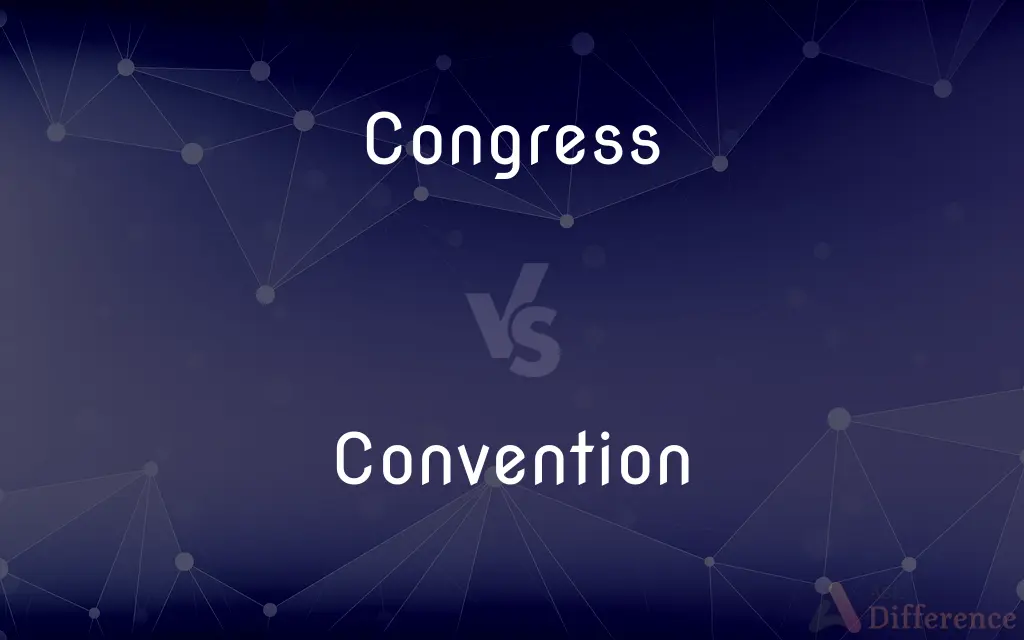Congress vs. Convention — What's the Difference?
By Fiza Rafique & Maham Liaqat — Updated on April 2, 2024
Congress refers to a formal meeting or assembly for discussion, especially among delegates, while a convention is a broader term for gatherings with shared interests, not limited to political ones.

Difference Between Congress and Convention
Table of Contents
ADVERTISEMENT
Key Differences
A congress often signifies a formal gathering aimed at deliberation, decision-making, or legislation, primarily within a political context. This is where representatives or delegates come together to discuss and resolve legislative and policy issues. On the other hand, a convention can refer to any large meeting of people who share a common interest, such as in professions, fandoms, or social causes, and may not necessarily focus on legislative processes.
Congress is typically associated with governmental bodies and the act of coming together for official legislative purposes. It can be a regular occurrence, such as the meetings of the national legislative bodies of countries like the United States or periodic events in organizations. Whereas a convention might be organized for a variety of purposes, including trade shows, fan gatherings, or professional development, and does not imply a legislative function.
The term congress often carries a formal and political connotation, suggesting structured debates, lawmaking, and decisions of national or international importance. It is a term deeply embedded in the political lexicon, symbolizing democratic deliberation and governance. In contrast, conventions are characterized by their diversity in purpose and audience, ranging from academic conferences to entertainment and hobbyist gatherings, emphasizing information exchange, networking, and community building.
While members of a congress are usually elected officials or appointed delegates representing larger groups with the authority to make decisions, attendees of a convention are typically participants sharing a common interest, without the same formal authority or decision-making capacity. Conventions may involve keynotes, workshops, and panels, focusing on sharing knowledge, entertainment, and fostering community connections.
Comparison Chart
Definition
A formal meeting for discussion among delegates.
A gathering of individuals with a shared interest.
ADVERTISEMENT
Primary Focus
Legislation and policy making.
Information exchange, networking, and entertainment.
Participants
Elected officials or appointed delegates.
Individuals or groups with common interests.
Frequency
Regular or periodic based on set schedules.
Can be annual, biennial, or as decided by organizers.
Outcomes
Laws, policies, official declarations.
Learning experiences, community engagement, product showcases.
Compare with Definitions
Congress
An official meeting of delegates representing different groups.
The workers' congress voted on a new collective bargaining agreement.
Convention
An assembly for trade shows or exhibitions.
The tech convention showcases cutting-edge technology and gadgets.
Congress
A national legislative body of a country.
The Congress of the United States consists of two chambers: the Senate and the House of Representatives.
Convention
A meeting with workshops, panels, and keynotes.
The writers' convention offers workshops on creative writing techniques.
Congress
A gathering for decision-making within organizations.
The annual congress of the sports federation discusses new rules and policies.
Convention
A large meeting of people with shared interests or professions.
The comic book convention attracts thousands of fans annually.
Congress
A meeting for political or legislative purposes.
The international congress on climate change aims to address global warming issues.
Convention
An event for enthusiasts in a particular hobby or fandom.
The annual gaming convention features previews of new video games.
Congress
A periodic assembly for discussing specific issues.
The congress convened to revise the national education curriculum.
Convention
A gathering for professional development and networking.
The medical convention hosts seminars on the latest health care innovations.
Congress
Congresses are formal meetings of the representatives of different countries, constituent states, organizations, trade unions, political parties or other groups. The term originated in Late Middle English to denote an encounter (meeting of adversaries) during battle, from the Latin congressus.
Convention
A formal meeting of members, representatives, or delegates, as of a political party, fraternal society, profession, or industry.
Congress
A formal assembly of representatives, as of various nations, to discuss problems.
Convention
The body of persons attending such an assembly
Called the convention to order.
Congress
The national legislative body of a nation, especially a republic.
Convention
An agreement between states, sides, or military forces, especially an international agreement dealing with a specific subject, such as the treatment of prisoners of war.
Congress
The national legislative body of the United States, consisting of the Senate and the House of Representatives.
Convention
General agreement on or acceptance of certain practices or attitudes
By convention, north is at the top of most maps.
Congress
The two-year session of this legislature between elections of the House of Representatives.
Convention
A practice or procedure widely observed in a group, especially to facilitate social interaction; a custom
The convention of shaking hands.
Congress
The act of coming together or meeting.
Convention
A widely used and accepted device or technique, as in drama, literature, or painting
The theatrical convention of the aside.
Congress
A single meeting, as of a political party or other group.
Convention
A meeting or gathering.
The convention was held in Geneva.
Congress
(archaic) A coming together of two or more people; a meeting.
Convention
A formal deliberative assembly of mandated delegates.
The EU installed an inter-institutional Convention to draft a European constitution.
Congress
A formal gathering or assembly; a conference held to discuss or decide on a specific question.
Convention
The convening of a formal meeting.
Congress
A legislative body of a state, originally the bicameral legislature of the United States of America.
Convention
A formal agreement, contract, rule, or pact.
Congress
An association, especially one consisting of other associations or representatives of interest groups.
The National Congress of American Indians
Convention
(international law) A treaty or supplement to such.
The Vienna convention at the Vienna Congress (1814-15) standardized most of diplomatic conduct for generations.
Congress
(intransitive) To assemble together.
Convention
A practice or procedure widely observed in a group, especially to facilitate social interaction; a custom.
Table seatings are generally determined by tacit convention, not binding formal protocol.
The convention of driving on the right is reinforced by law.
Congress
To meet in a congress.
Convention
The act of coming together; the state of being together; union; coalition.
The conventions or associations of several particles of matter into bodies of any certain denomination.
Congress
A meeting of individuals, whether friendly or hostile; an encounter.
Here Pallas urges on, and Lausus there;Their congress in the field great Jove withstands.
Convention
General agreement or concurrence; arbitrary custom; usage; conventionality.
There are thousands nowSuch women, but convention beats them down.
Congress
A sudden encounter; a collision; a shock; - said of things.
From these laws may be deduced the rules of the congresses and reflections of two bodies.
Convention
A meeting or an assembly of persons, esp. of delegates or representatives, to accomplish some specific object, - civil, social, political, or ecclesiastical.
He set himself to the making of good laws in a grand convention of his nobles.
A convention of delegates from all the States, to meet in Philadelphia, for the sole and express purpose of reserving the federal system, and correcting its defects.
Congress
A gathering or assembly; a conference.
Convention
An extraordinary assembly of the parkiament or estates of the realm, held without the king's writ, - as the assembly which restored Charles II. to the throne, and that which declared the throne to be abdicated by James II.
Our gratitude is due . . . to the Long Parliament, to the Convention, and to William of Orange.
Congress
A formal assembly, as of princes, deputies, representatives, envoys, or commissioners; esp., a meeting of the representatives of several governments or societies to consider and determine matters of common interest.
The European powers strove to . . . accommodate their differences at the congress of Vienna.
Convention
An agreement or contract less formal than, or preliminary to, a treaty; an informal compact, as between commanders of armies in respect to suspension of hostilities, or between states; also, a formal agreement between governments or sovereign powers; as, a postal convention between two governments.
This convention, I think from my soul, is nothing but a stipulation for national ignominy; a truce without a suspension of hostilities.
The convention with the State of Georgia has been ratified by their Legislature.
Congress
The collective body of senators and representatives of the people of a nation, esp. of a republic, constituting the chief legislative body of the nation.
Convention
A large formal assembly;
Political convention
Congress
The lower house of the Spanish Cortes, the members of which are elected for three years.
Convention
Something regarded as a normative example;
The convention of not naming the main character
Violence is the rule not the exception
His formula for impressing visitors
Congress
The legislature of the United States government
Convention
(diplomacy) an international agreement
Congress
A meeting of elected or appointed representatives
Convention
Orthodoxy as a consequence of being conventional
Congress
A national legislative assembly
Convention
The act of convening
Common Curiosities
Who attends a convention?
Conventions are attended by individuals or groups with common interests, professionals, enthusiasts, or fans, depending on the theme of the convention.
What is a congress?
A congress is a formal meeting or assembly, especially one involving representatives or delegates for discussion, decision-making, or legislation, often within a political context.
How does a congress differ from a convention?
A congress is focused on formal legislative and policy-making activities, often within a political or organizational context, while a convention is broader and can involve various activities like trade shows, fan gatherings, or professional conferences.
Who attends a congress?
A congress is attended by elected officials, appointed delegates, or representatives of organizations, depending on its nature.
How often do conventions take place?
Conventions can be annual, biennial, or occur at intervals decided by their organizers, depending on the purpose and audience.
Are conventions always related to hobbies or entertainment?
No, conventions can also be professional, educational, or trade-related, serving purposes beyond hobbies and entertainment.
Do congresses and conventions occur worldwide?
Yes, both congresses and conventions occur worldwide, addressing global, national, or local interests and issues.
What is a convention?
A convention is a gathering of individuals, groups, or organizations with a shared interest, typically for the purposes of information exchange, networking, entertainment, or professional development.
Can a convention have elements of a congress?
Yes, some conventions, especially those related to professional organizations, may include elements similar to a congress, such as decision-making sessions or policy discussions, but these are not their primary focus.
Can anyone attend a convention?
While some conventions are open to the public, others may require membership, registration, or an invitation.
Is attendance at a congress mandatory?
For members or delegates, attendance at a congress may be mandatory or highly expected, especially if it involves decision-making or legislative activities.
What are the typical outcomes of a congress?
Outcomes of a congress include laws, policies, or official decisions and declarations.
What are the typical outcomes of a convention?
Outcomes of a convention can include shared knowledge, community engagement, new business connections, and enjoyment.
How often do congresses take place?
The frequency of congresses depends on their specific type; national legislative bodies typically meet regularly, while other congresses may be periodic or event-based.
Can a convention influence public policy?
While not their primary focus, some conventions, especially those involving professionals or industry leaders, can influence public opinion or policy through discussions and presentations.
Share Your Discovery

Previous Comparison
Ethnicity vs. Nationality
Next Comparison
Pomelo vs. GrapefruitAuthor Spotlight
Written by
Fiza RafiqueFiza Rafique is a skilled content writer at AskDifference.com, where she meticulously refines and enhances written pieces. Drawing from her vast editorial expertise, Fiza ensures clarity, accuracy, and precision in every article. Passionate about language, she continually seeks to elevate the quality of content for readers worldwide.
Co-written by
Maham Liaqat















































